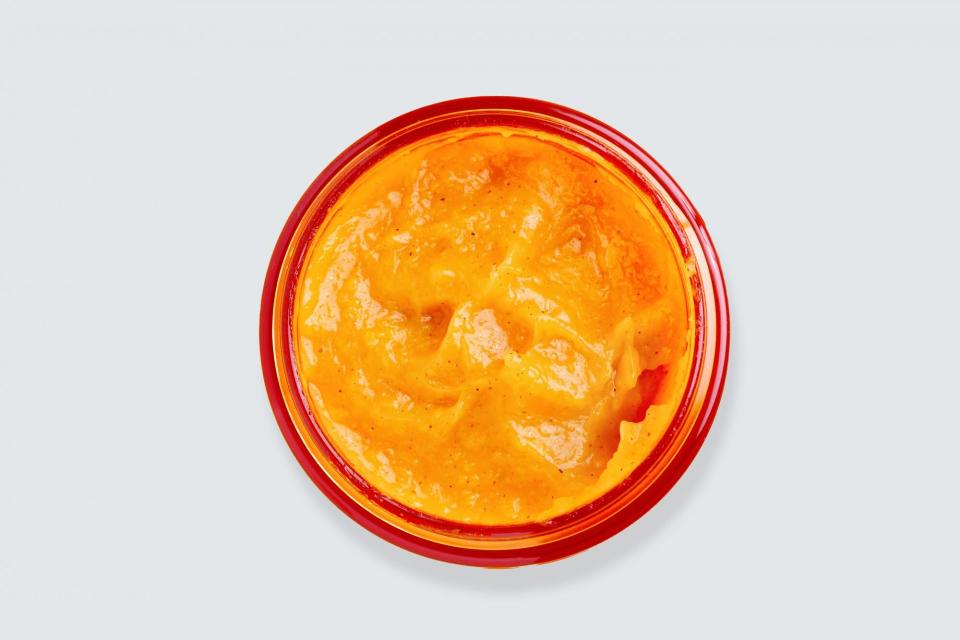Pumpkin Enzymes Have Become a Popular Skin Care Ingredient—How Do They Work?
When the fall season rolls around, it's natural to turn our attention to all things pumpkin-related. While lattes and pie are, of course, at the forefront of those conversations, we want to focus in on one of the squash's beauty-centric iterations: pumpkin enzymes. Believe it or not, this ingredient can treat a myriad of skin concerns and is found in many of today's products. To better understand this additive, we asked board-certified cosmetic dermatologist and Mohs surgeon Dendy Engelman, MD, of the Shafer Clinic and board-certified dermatologist and associate professor of dermatology at Mount Sinai Joshua Zeichner, MD, to answer all our pumpkin-meets-skin-care-related questions.
Related: Seven Expert-Approved Skincare Products Available at the Drugstore
Pumpkin Enzymes, Explained
According to Dr. Engelman, pumpkin enzymes are alpha-hydroxy acids (AHAs) that encourage skin gentle exfoliation. They also contain vitamin A to stimulate collagen production and antioxidant vitamin C, which tones and brightens the complexion. Zinc is yet another component; it can balance oil and reduce breakouts.
The Benefits of Squash
Because pumpkin enzymes are filled with so many results-delivering ingredients, they boast a plethora of benefits. According to Dr. Zeichner, they exfoliate dead cells and, thanks to that vitamin C content, protect the dermis from environmental aggressors. Dr. Engelman agrees, adding that pumpkin enzymes also firm and plump the skin and are more gentle than their chemical exfoliant counterparts—which makes them a great option for those with sensitive complexions.

Tatyana Abramovich / Getty Images
Exfoliating Enzymes
Pumpkin enzymes resurface skin without being harsh or irritating, so you will most often find them in exfoliating masks and scrubs, says Dr. Engelman. The best part? The widely-tolerated ingredient can be used by virtually everyone—but take caution if you tend to be hyper-reactive, advise both Dr. Engelman and Dr. Zeichner. "Pumpkin enzymes still have the potential to be irritating and may cause redness and burning if not applied properly or if they are mixed with harsher acids," notes Dr. Engelman.
When paired with other ingredients like retinol or exfoliating acids, for example, pumpkin enzymes can be too much, notes Dr. Zeichner, who advises using them alongside hydrating, soothing ingredients like niacinamide or hyaluronic acid. And if sensitivity isn't an issue? Dr. Engelman notes that pumpkin enzymes can be mixed with other hydroxy acids, like glycolic or lactic, for stronger exfoliation.
Pumpkin-Filled Products to Try
If you're interested in testing out a product with this hero ingredient, look to Dr. Zeichner's favorite, the Bliss Powerhouse Resurfacing & Exfoliating Enzyme Mask ($16, ulta.com). It contains exfoliating hydroxy acids and enzymes that fortify the skin barrier and boasts shea butter and hyaluronic acid for hydration. Dr. Engelman prefers to deliver this active in peel form; she likes Glo Skin Beauty's Pumpkin Enzyme Scrub ($40, dermstore.com), which is both a chemical and physical exfoliant. This formula combines pumpkin enzymes and jojoba beads to buff away dead skin cells. She also enjoys the Peter Thomas Roth Pumpkin Enzyme Mask Enzymatic Dermal Resurfacer ($60, sephora.com), which helps with dullness, fine lines, and breakouts.

